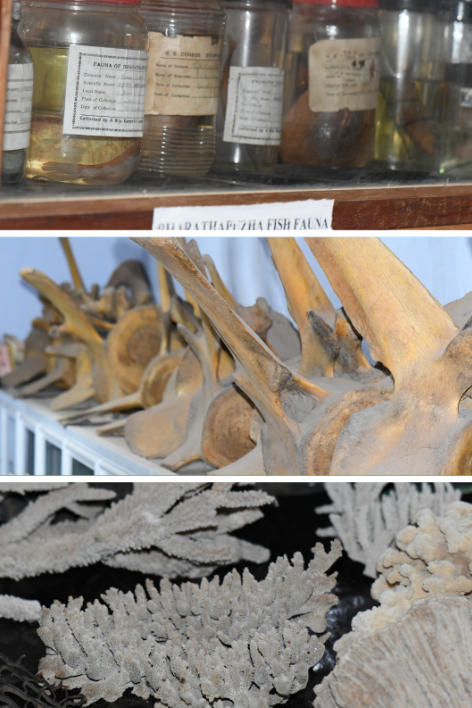Zoology Museum

The Zoology museum of the college is a treasure trove of biological specimens, offering a fascinating glimpse into the animal kingdom. The museum houses a wide variety of preserved animals, from invertebrates like insects and mollusks to vertebrates like fish, amphibians, reptiles, birds, and mammals.
The Museum houses a collection of:
- Wet specimens: These faunal specimens are carefully preserved to prevent decomposition. They include specimens that are mounted on stands, stored in jars of fluid, or dried.
- Osteology: Skeletons can reveal a lot about an animal’s anatomy and how it moved. The Museum has complete skeletons of many different animals, as well as disarticulated skeletons (where the bones are separated). The museum owns vertebrae of different vertebrates, skulls of many different animals, including those of humans. The museum collections include a rare collection of vertebrae and ribs of a whale. The museum also owns a collection of a carapace of a turtle.
- Slides: The museum harbors slides of microscopic fauna including different arthropod collections, anatomical structures of various non-chordata and chordate animals, cells and tissues of humans and other vertebrates, sections of embryological stages of various animals.
- Models and Charts: Models are used to show animals in their natural habitat or to illustrate anatomical features that would be difficult to see on a preserved specimen. The museum houses models of various organs of humans to understand the internal structure, a few animals of rarity or extinction.
The major objective for the maintenance of a museum:
- Education: The museum provides students with a hands-on opportunity to learn about animal anatomy, physiology, evolution, and ecology. Specimens can be examined in much more detail than pictures in a textbook.
- Research: The Museum contains a rare collection of fish fauna of Bharathapuzha river that are invaluable for scientific study. Researchers can use these specimens to learn about the diversity of fish fauna of the Bharathapuzha river since 1997.
Public Outreach: The Museum helps to educate the public about the importance of biodiversity and conservation. The museum has taken up open exhibitions for students of the college and neighbouring schools as part of the extension to locale.

Contact
NSS College Ottapalam,
Palakkad – Ponnani Rd,
Palappuram P O,
Palakkad – 679 103,
Kerala,
India.
Office: 0466 224 4382
E-mail: support@nsscollegeottapalam.org
